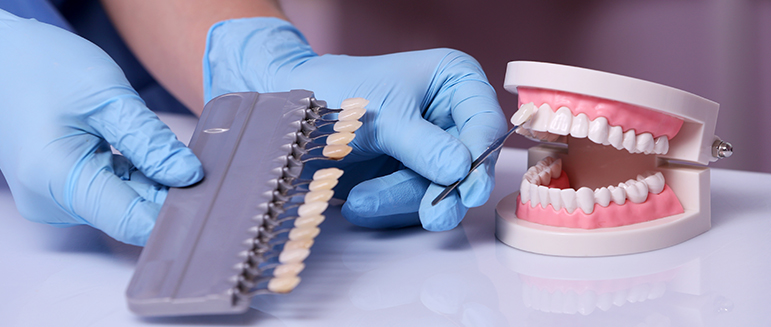Prosthodontics or dental prosthetics is a specialty in dentistry involving the diagnosis, treatment planning, rehabilitation and maintenance of the oral function, health and aesthetics of patients with missing teeth, deficient teeth and/or compromised oral and maxillofacial tissues using biochemical substitutes.
A Prosthodontist is a specialist who specializes in replacement and maintenance of the teeth and help in restoring the appearance of a person’s smile in the best possible manner. There are a lot of factors that contribute to the loss of teeth. While some lose their teeth because of injury, disease or wear and tear such as grinding and clenching, others are born without certain teeth. Tooth loss creates both aesthetic and functional inconveniences. At times this may result to undesirable facial changes, detrimental effects on chewing ability and consequently, damaging one’s confidence and self-esteem.
Procedures offered by our Specialist Prosthodontists
- Dental Crowns
- Dental Bridges
- Dentures
- Dental Veneers
- Temporomandibular Joint TMJ and Temporomandibular Disease TMD
- Full Mouth Rehab
Crown and Bridge

Over time, teeth can be damaged, cracked or weakened by decay. Dentists use a crown to entirely cover or “cap” a damaged tooth. Crowns are made to match the color of your natural teeth, and besides strengthening an impaired tooth, these can be used to improve your teeth’s appearance, shape or alignment.
Dental crowns can be fashioned from stainless steel, ceramic, acrylic, gold and metal alloys. Unlike removable devices such as dentures, crowns are cemented onto existing teeth or implants, and can only be removed by your dentist.
Crowns are made to match the color of your natural teeth, and besides strengthening an impaired tooth, these can be used to improve your teeth’s appearance, shape or alignment.
Our dental experts may recommend a crown to:
- Protect a weak tooth from breaking, or hold together segments of a cracked tooth
- Restore an already damaged tooth
- Replace a large filling when there is not enough tooth remaining
- Hold a dental bridge in place
- Cover a dental implant
- Cover a badly shaped or severely discolored tooth
- Cover a tooth that has had root canal treatment
How long does a dental crown last?
With good oral hygiene, crowns can last a lifetime. A crown may come loose or fall out if the underlying tooth is damaged by gum disease or tooth decay. While a crowned tooth does not require any special care, it is important to keep your gums and teeth healthy by brushing with fluoride toothpaste for two minutes twice a day and flossing daily.
Also, remember that regular checkups and professional cleanings are just as necessary to make sure you maintain your optimum oral health.

